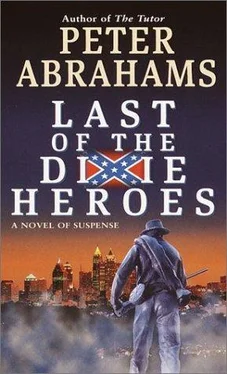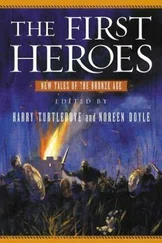Peter Abrahams - Last of the Dixie Heroes
Здесь есть возможность читать онлайн «Peter Abrahams - Last of the Dixie Heroes» весь текст электронной книги совершенно бесплатно (целиком полную версию без сокращений). В некоторых случаях можно слушать аудио, скачать через торрент в формате fb2 и присутствует краткое содержание. Жанр: Триллер, на английском языке. Описание произведения, (предисловие) а так же отзывы посетителей доступны на портале библиотеки ЛибКат.
- Название:Last of the Dixie Heroes
- Автор:
- Жанр:
- Год:неизвестен
- ISBN:нет данных
- Рейтинг книги:4 / 5. Голосов: 1
-
Избранное:Добавить в избранное
- Отзывы:
-
Ваша оценка:
- 80
- 1
- 2
- 3
- 4
- 5
Last of the Dixie Heroes: краткое содержание, описание и аннотация
Предлагаем к чтению аннотацию, описание, краткое содержание или предисловие (зависит от того, что написал сам автор книги «Last of the Dixie Heroes»). Если вы не нашли необходимую информацию о книге — напишите в комментариях, мы постараемся отыскать её.
Last of the Dixie Heroes — читать онлайн бесплатно полную книгу (весь текст) целиком
Ниже представлен текст книги, разбитый по страницам. Система сохранения места последней прочитанной страницы, позволяет с удобством читать онлайн бесплатно книгу «Last of the Dixie Heroes», без необходимости каждый раз заново искать на чём Вы остановились. Поставьте закладку, и сможете в любой момент перейти на страницу, на которой закончили чтение.
Интервал:
Закладка:
Roy parked in front of Marcia’s house. Rhett got out, walked to the door without waiting for Marcia, as though leaving them alone on purpose. Marcia turned to Roy.
“Thanks for a very nice day.”
“How about tomorrow?”
“Tomorrow what?”
“We could do something.”
“Tomorrow’s Sunday.”
“So?”
“Don’t, Roy.”
“Don’t what?”
“Let’s just take our time, that’s all.”
“Take our time for what? Getting to know each other?”
“In a way,” Marcia said. She laid her hand on his. Her skin was cold. “You’re a good man, Roy. Even I can see that.”
“But?”
“No buts.”
In the rearview mirror, Roy saw the Mercedes coming up the street. “Was it the truth, Marcia? When you said you’d made a mistake about Barry.”
“Oh, yes,” said Marcia. “I made a mistake about Barry. A doozie.”
That was that. What else was there to know? Roy couldn’t imagine any other impediment he couldn’t handle. He reached into his pocket. “Here,” he said.
“What’s this?”
“For you.”
“These are beautiful.”
“A kind of emerald.”
“I know that, Roy. But I just couldn’t.”
“Why not?”
“I couldn’t, that’s all.” She rolled the emeralds gently in her fingers.
“Just try it out for a few days. It can always go back.”
“I couldn’t.”
The Mercedes turned into the driveway. Barry got out, glanced at them-he didn’t look good, unshaven, shirttail hanging beneath the hem of his jacket-and hurried toward the house, carrying an armful of papers. Barry had a little trouble with the front door, dropped two or three sheets without knowing it. A rainy gust of wind whisked them away. The emeralds made a soft clicking sound.
“It can go back?” said Marcia as the door closed behind Barry.
“Why not?”
“In that case.” She slipped the necklace in her purse.
Later that night, Rhett called Roy. “Can I get a dog?”
Roy laughed at that, laughed again when he was brushing his teeth, once more getting into bed. He slept like a baby.
SIX
It was still raining, or raining again, when Roy drove through the gates of the Girl Scout camp the next day. He parked in the lot beside a Porta Potti truck, put on a rain jacket, opened his umbrella, and walked toward a row of tree-sheltered cabins he could see in the distance. The cabins were padlocked, the windows boarded up. Roy kept going, beyond the cabins, up a path covered with pine needles, into deeper woods. He came to a three-pronged fork where signs on the trees pointed to nature walk, computer lab, and arts and crafts. Roy chose nature walk.
The nature walk path led up a gradual slope lined with pines and waxy-leafed trees whose name Roy didn’t know. The rain fell harder, making percussive sounds on the waxy leaves, still bright green and shiny new. Other than the rain, it was quiet. Roy slipped on a tree root, stepped in a puddle, got his foot wet. Had no one come? Had they canceled the event? Roy was slowing down, almost ready to turn back, when he heard a voice close by.
“No one’s worth that kind of money.”
Another voice: “Know what your problem is? You’re living in the past.”
“Bullshit.”
“No bullshit. Sports is entertainment now, pure and simple. Drive in a hundred and thirty runs, you write your own ticket, just like the movies, that faggy little actor, what’s his name.”
Roy looked around, saw no one. “Anybody here?” he called.
Silence. Then came the sound of metal clanking on rock.
“Hey!”
“Not ‘hey,’ for fuck sake.”
“Oh, yeah. Who goes there?”
Two men wearing uniforms like Gordo’s came scrambling out from behind a boulder ten or fifteen feet off the path, both of them now calling, “Who goes there?” They saw Roy. One stuck a flask in an inside pocket. The other said, “Stand and identify yourself.” A low-hanging branch knocked his hat off as he came closer.
“I am standing,” Roy said.
They didn’t seem to hear him. The one with the flask said, “Oops.”
“What do you mean-oops?” said the hatless one.
“We forgot the guns.”
“Muskets, for Christ sake. Or weapons. Never guns. Guns are cannon.”
“Whatever. Shouldn’t we get them?”
They looked back toward the rock. Roy saw that they’d built a shelter behind it-plastic trash bags stretched over muskets stuck in the ground, bayonet first.
“Probably.”
“But then we’d have to put the whole damn thing back up again.”
They turned to Roy, waiting under his umbrella. The hair of the hatless one was already soaked flat against his skull; the peak of the other one’s hat-kepi, was that what Gordo had called it? — was directing a tiny waterfall onto the tip of his nose.
“I’m looking for Gord Coker,” Roy said.
“Gordo?”
“Correct,” said Roy.
“He’s in camp.”
“In a tent, nice and dry.”
“Where is it?” Roy said.
“Lucky son of a bitch,” said the one with the flask.
“Third on the right,” said the other.
“Third is Jesse,” said the one with the flask. “Gordo’s one more down.” He turned to Roy. “Fourth tent on the right.”
“I meant the camp,” Roy said.
“The camp?”
“I’m sure I can find the tent on my own.”
“Huh?”
“After I get to the camp.”
“You asking where the camp is?” said the hatless one.
“I am.”
“Thataway, quarter mile or so.”
“Thanks.”
Roy started down the path. He heard one of them saying, “Isn’t one of us supposed to accompany any stranger into camp?”
And the other: “Stranger? You heard him-he’s here to see Gordo.”
Pause. “We should have asked him to send someone back with those BLTs.”
Roy passed a tree labeled sweetgum, another labeled american sycamore, and a third, resembling the waxy-leafed one, although he wasn’t sure if it was the same species, labeled post oak. He came to a grassy clearing. There were about a dozen white tents in the clearing, arranged in two rows on either side of a black cannon. It was quiet and still: nothing to hear but rain on canvas, nothing stirring but the rebel flag on a pole above the first tent on the right. Roy paused outside.
“Anybody home?”
“Roy? That you?” The flap opened. Gordo appeared in his uniform, the butternut jacket, gray trousers, yellow suspenders, black half boots that conformed to no current fashion. He actually looked pretty good. “Come on in.”
Roy folded his umbrella. Another uniformed man came up behind Gordo, peered out. “Where’s the picket?” he said.
“What’s that?” said Roy.
“Like a sentry,” Gordo said.
“Supposed to be a picket escorting every visitor,” said the other man. “Standing orders.”
“They need BLTs,” Roy said, ducking into the tent.
“Now you know why we lost the war,” the man said; a man of about Roy’s height, but thinner, slightly stooped, balding. He reminded Roy of an English teacher he’d had in high school.
“Roy,” said Gordo, “Jesse Moses, second lieutenant, Seventh Tennessee. Jesse, Roy Hill I was telling you about. Roy Singleton Hill.”
They shook hands. “Gordo’s been telling me about you,” said Jesse Moses. “Welcome to the Seventh Tennessee.”
“I’m just visiting,” Roy said.
“Glad to have you. I’ll fetch the colonel.” He threw a gray cape over his shoulders and left the tent.
Roy looked around, saw a rough wooden table, the kind of thing you might find at a flea market. A candle burned on the table, illuminating a map that looked yellowed with age in the dim light.
Читать дальшеИнтервал:
Закладка:
Похожие книги на «Last of the Dixie Heroes»
Представляем Вашему вниманию похожие книги на «Last of the Dixie Heroes» списком для выбора. Мы отобрали схожую по названию и смыслу литературу в надежде предоставить читателям больше вариантов отыскать новые, интересные, ещё непрочитанные произведения.
Обсуждение, отзывы о книге «Last of the Dixie Heroes» и просто собственные мнения читателей. Оставьте ваши комментарии, напишите, что Вы думаете о произведении, его смысле или главных героях. Укажите что конкретно понравилось, а что нет, и почему Вы так считаете.












